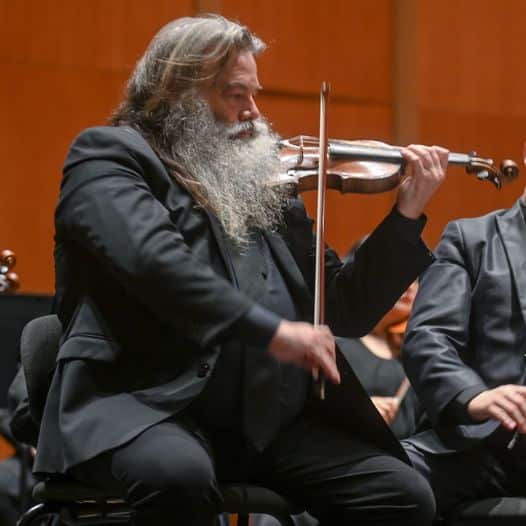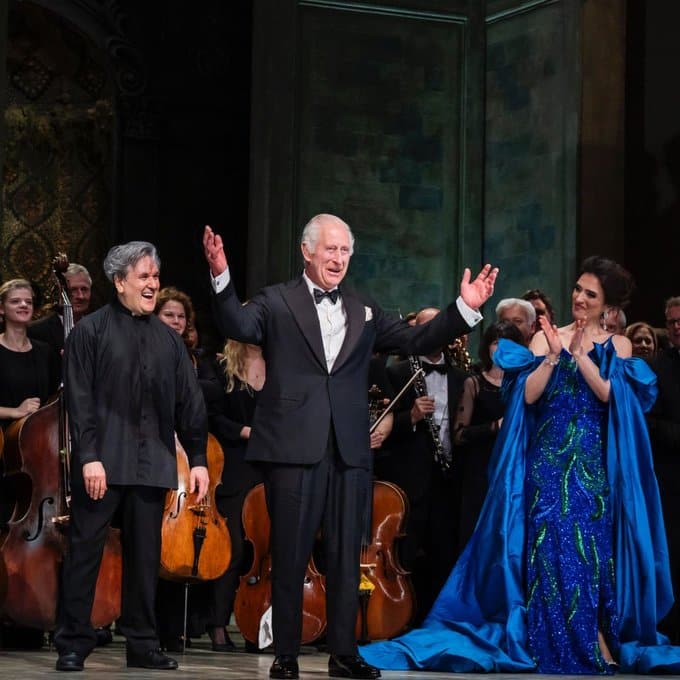Symphony hall is threatened with wrecking ball
OrchestrasThere are growing concerns about the future of Maurice Abravanel Hall, home to the Utah Symphony, as Salt Lake City moves to demolish the site to make way for a sports arena.
No provision has been made for a new concert hall.
All other considerations aside, it is one of few concert halls in America that is named after a musician, not a donor.
Read here.






How sad. Suck and tired of the sports craze in this country.
I was just in Salt Lake City a week ago to see the Utah Symphony and Ingrid Fliter. There was a large and appreciative audience attending the concert. The hall has excellent acoustics to showcase this orchestra. That its destruction is being considered by local politicians is shameful.
I used to live in SLC and there is no doubt that the symphony is generally well-supported. But where I will disagree with you, PaulD, is on the hall’s acoustics. To my ears, it has a dull sound and is not particularly vibrant, and it does no favors to the orchestra. I’ve sat in many seats in the hall, including in the upper balcony which I’ve been told is where the sound is best. At the end of the day, I don’t find it to be anything more than an average hall acoustically. And not that I’ve visited so many concert halls in the country, but right off the top of my head I can think of many that are better acoustically, including Symphony Hall (Boston), Carnegie Hall, Eastman Theatre (Rochester), and Orchestra Hall (Detroit). And I really liked the Harpa Center in Iceland – which was both visually stunning and acoustically vibrant.
If SLC decides to level the hall for a sports arena and ensures that a new hall is built elsewhere that is equally accessible, it may not be a terrible thing if they can get the acoustics right. Still, the current location is excellent, and likely any other location will be inferior.
In the end, the interpretation of acoustics is almost entirely personal, despite generalized “agreement” on those of some halls. The notions of “dry” versus “wet,” distant-sounding versus immediate. Resonance versus reverberation. Etc.
I quote your lines:
“To my ears, it has a dull sound and is not particularly vibrant, and it does no favors to the orchestra. I’ve sat in many seats in the hall, including in the upper balcony which I’ve been told is where the sound is best. At the end of the day, I don’t find it to be anything more than an average hall acoustically.”
I have been to many hundreds of concerts at Abravanel Hall, and other local pop and rock venues. I have not been to many other concert halls in the scheme of things either, but I have been to Walt Disney Hall, Carnegie Hall, the old David Geffen Hall for the NY Philharmonic, the MET Opera house, Segerstrom Concert Hall, the hall for the Vienna State Opera, and I fundamentally disagree with your take on this one. But that is as it should be in the world of acoustics, which is still an “art,” with all the attendant preferences, not a “science” in an expansive meaning of that term.
Bottom line: if you read enough reviews of even commercial recordings, one critic will praise the recording acoustics and another will damn them. The same goes for in-person acoustic preferences. No harm done.
There is no art or science to acoustics, that is a myth created by people who want employment at high prices and to control architecture and design. The principles are ancient, and easily replicated. Avoiding modernist architecture is the main ingredient.
Totally agree with your assessment. Sadly, it’s a perfect reflection of LDS standards.
And the best way to get a hall built is if it’s wrapped in the package of a much higher-priority (and far more expensive) basketball/hockey arena, where the cost might be a bit of a rounding error.
It’s a wonderful hall. It would be a travesty to demolish it.
This scenario is not going to happen.
The line that “…as Salt Lake City moves to demolish the site to make way for a sports arena.” is incorrect, and not backed by the so-called “evidence” in the recent Salt Lake Tribune article or the KSL-TV article by Carole Mikita of Saturday, May 4, 2024.
The statement by Utah Symphony President and CEO Steve Brosvik is the following:
“While the path forward is not yet finalized, Mayor Wilson, Mayor Mendenhall, and Governor Cox have all expressed their support for and recognition of the value of the arts in Utah, as well as their commitment to ensuring that an outstanding hall for the Utah Symphony is a top priority,” Brosvik said. “Our current home has a remarkable legacy and holds deep meaning for so many in our community. We also know that the downtown re-development project presents an extremely exciting opportunity for Salt Lake City.”
Taken out of context, this statement is not the most precise one, but it can and is being used to likely generate concern that is not necessarily warranted. More clarity is needed, and should be forthcoming shortly.
There have been tentative plans in the works for a few years regarding an upgrade to the seating arrangement in Abravanel Hall and its electrical systems and other internal improvements. The statement by Mr. Brosvik is in a likelihood being dramatically over-interpreted.
There is no harm in generating attention for the building, which is owned by Salt Lake County, and that the Utah Symphony rents for several hundred thousand dollars per year.
The real absurdity is contained in the following line from the Salt Lake Tribune article of April 30, 2024:
“A complete reimagining of the Salt Palace Convention Center appears to be in the project. That would allow improved flow from West Temple to 300 West, where the Delta Center sits. Convention space could be decreased or reconfigured, allowing for room to a “front entrance” patio leading into the Jazz’s and new NHL team’s home.
The “flow” of people from the south side of South Temple Street to the Delta Center works just fine as it currently stands. The Delta Center does not need a “front entrance” patio, since it looks just fine as it currently stands.
This is the quote on the situation from Salt Lake County Councilmember Jim Bradley this past week in the Salt Lake Tribune:
“Tearing down stuff because it is in the way is not something you just do willy-nilly. Take the example of Abravanel Hall: That would be a tragedy to tear that down and build it somewhere else,” he said. “Some people are saying, ‘Well, it needs more in rehab than what it would take to tear it down and rebuild it.’ Well, that is developers talking, ‘There’s that building that’s in my way.’”
The building is in danger. It was just a year or two ago that the city took the wrecking ball to the historic Pantages Theatre on Main Street for the exact same reason – “too costly to rehab – might as well tear it down and put something else there.”
The county owns and operates the venue, and all the quotes from the city and county leaders have been very non-committal when it comes to the venue. All they’re committed to is finding a place for the orchestra to play, which could mean anything.
why not be like most cities and basketball and hockey share the same arena.
Music lovers of Salt Lake City…unite! Don’t lest this happen.
Don’t let this happen. Not “lest” soory for the typo.
sorry: I need to wake up!
W T F !!!! I’m sick of sports and their arenas! TRAVESTY!!
Having lived in Salt Lake City, I can assure you that the final decision will be made by the upper echelons of the LDS church.
If Abravanel Hall is to be torn down, a new home will be found for the Utah Symphony. Having a symphony orchestra is still a measure of being a “world-class” city and, so, the church elders have an ongoing interest in supporting the orchestra’s existence.
Hence, the members of the Utah Symphony probably have more job security than they might in many other orchestras.
Sadly, the name Maurice Abravanel is sub rosa. Forgotten except by those who care. He did turn the Utah Symphony from nothing, to something and for a while, the leading Mahler Orchestra in the United States. I suspect most in Salt Lake City could not care less. That said, if it eventually leads to a brand new symphony hall somewhere else within the City, perhaps it is not a bad idea.
Miller Hall?
Smith Hall? (and there are a variety of first names that can go with that)
Huntsman Hall?
Romney Hall?
Keith Lockhart Hall? (hahaha)
Lockhart, the human metronome?
The latest information from Salt Lake County, Salt Lake City, and Ryan Smith’s Smith Entertainment Group (SEG) via the open, online Salt Lake County government public hearing this afternoon, May 7, 2024, is that Abravanel Hall in a “renovated” or “rebuilt” (the latter should be aka “demolished”) form is up for input from all stakeholders.
The Smith Entertainment Group wants any version of the future of a symphony hall to remain in the exact location that it currently is, which means that the question of whether to “renovate” or “rebuild” Abravanel Hall is more or less outside the scope of SEG’s planning per se.
The public statement by Salt Lake City, Salt Lake County, and the Utah Symphony and Utah Opera this afternoon states that a comprehensive “renovation” of Abravanel Hall would cost several hundred million dollars based on the current year-long assessment. This purported figure is likely controversial, and needs to be supported by publicly-released line-item financial statements.
Let the arguments now commence, since nothing is likely to happen to Abravanel Hall yet in the next few years before a decision is made by input from “all stakeholders.”
How many Christians in SLC?
Utahns hold Abravanel Hall as a symbol that declares Utah a state of the arts. Its construction signified the detachment of the Utah Symphony from its reliance on the LDS Church for a concert hall–the Tabernacle on Temple Square, where the USO performed until Abravanel Hall was built by Salt Lake County in the 1970s. The hall allowed the orchestra to finally stand on its own. (It also compelled the church to create its own orchestra.) It was a significant statement of the separation of church and state–not that the church has not maintained certain influence over the orchestra. It’s a visually stunning concert hall and, in the opinion of many, an acoustic delight. Having once sung an aria on the stage of Abravanel Hall, I tell you, as a singer, the acoustics are a dream. For several reasons, Utahns hold Abravanel Hall dear. They still cherish their maestro as a catalyst and symbol of the arts in Utah. The loss of the hall would be tragic to the community. Sometimes the best economic plan is not the best plan.